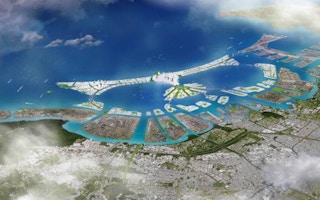The developers behind Islet G, a small artificial island off the coast of Jakarta, may have finally been given the legal green light to continue the project, which has been stalled since April of this year.
On Oct. 20, an Indonesian court overturned a lower court’s earlier ruling that Islet G developer PT Muara Wisesa Samudra (MWS) must halt land reclamation activities in the Jakarta Bay. The lower court’s decision came in response to a lawsuit filed by the Coalition for Saving the Jakarta Bay, an alliance of fishing communities and environmental activists.
The group claims the development of Islet G, which is part of a broader plan to construct 17 artificial islands in Jakarta Bay, is causing environmental damage to the bay and destroying the livelihoods of local fishermen. On May 31, a local court in Jakarta agreed with the plaintiffs, ordering the company to cease development and instructing Jakarta’s governor to revoke the development permit issued by the city in 2014.
Jakarta Governor Basuki Tjahaja Purnama—better known by his nickname Ahok—and PT MWS appealed, and last month the Jakarta State Administrative High Court overturned the May decision. The court’s verdict stated the plaintiffs had filed their suit against the Islet G developers more than 90 days after learning about the permit for the project, a legal technicality High Court judges said rendered the earlier court decision void.
The decision came just over a month after the Coordinating Maritime Minister Luhut Binsar Pandjaitan announced that the project could move ahead despite the lower court’s order to halt development.
“At the moment there is no reason for us not to continue with the reclamation of the North Jakarta coast,” Pandjaitan told Mongabay-Indonesia after a Sept. 13 closed-door meeting with officials representing both the city and national government, including Governor Ahok.
The Jakarta Bay reclamation project, which proponents say will reduce pollution in the bay while opening up space for new housing in the densely populated city, was temporarily halted in April 2016 by Pandjaitan’s predecessor, Rizal Ramli.
This suspension came after the multimillion dollar project became the center of a corruption scandal involving Jakarta City Councilor Mohamad Sanusi and PT Agung Podomoro Land, the parent company of Islet G developer MWS. Sanusi was accused of accepting bribes from the company to influence zoning regulations, and was arrested by Indonesia’s Corruption Eradication Commission (KPK) in relation to the case. The KPK also arrested PT Agung Podomoro Land President-Director Ariesman Widjaja, who was later sentenced to three years in prison.
“
We demand the reclamation project be halted until we can come up with a clear legal framework.
Rizal Ramli, coordinating maritime minister, Jakarta, Indonesia
After the bribery scandal came to light, Ramli and Forestry Minister Siti Nurbaya Bakar met with Ahok on April 18 to discuss the land reclamation project. Following that meeting, Ramli announced the government would temporarily suspend all reclamation activities in the Jakarta Bay until legal issues related to the project could be resolved. He also announced the formation of a joint task force to investigate the social and environmental consequences of reclamation.
“We demand the reclamation project be halted until we can come up with a clear legal framework,” Ramli told reporters during a press conference after the meeting.
Uncertain future
Although Pandjaitan and others have stated that the project is now free to continue, the fate of Islet G is still far from certain. After Pandjaitan announced in September that there was “no reason … not to continue,” the Ministry of Environment and Forestry responded that all the requirements for relaunching the project had not in fact been met.
“The developer has already adhered to some of the obligations, but some have not yet been adhered to, so the sanctions cannot be lifted at the moment. There must be an improvement of the environmental documents to address various issues,” forestry minister Bakar told Mongabay-Indonesia on Sept. 14.
Environmental and Forestry Spatial Planning Director-General San Afri Awang, who was part of the joint task force, echoed Bakar’s statement. He further explained that the company must revise the project’s Environmental Impact Assessment to address task force findings related to potential social, economic and environmental consequences of the project. “Environmental issues must not be neglected,” he said.
After the court announced its decision on Islet G in October, Bakar made a similar statement, explaining that the court ruling did not mean the project could immediately resume as the project’s Environmental Impact Assessment needed to be updated.
“Reclamation cannot continue if the environmental document has not been revised,” Bakar told Indonesia’s Tempo Magazine on Oct. 21.
Meanwhile the Indonesian Traditional Fishermen Union (KNTI), one of the organisations involved in filing the lawsuit, said the coalition would report to the Jakarta Police anyone involved in construction activities related to Islet G and several other artificial islands.
“The project has ruined the environment and harmed the livelihood of fishermen,” said Marthin Hadiwinata of KNTI told the Jakarta Post last month. The project, he explained, would cost fishing communities over $2,000 annually for every hectare of seabed reclaimed.
“We can charge them under Article 86 of the Fishery Law,” Hadiwinata said, citing a law under which those intentionally conducting activities that cause damage to fisheries or pollute fishing areas can be penalized with up to 10 years in prison or IDR 2 billion ($152,000) in fines.
This story was published with permission from Mongabay.com. Read the full story.

















